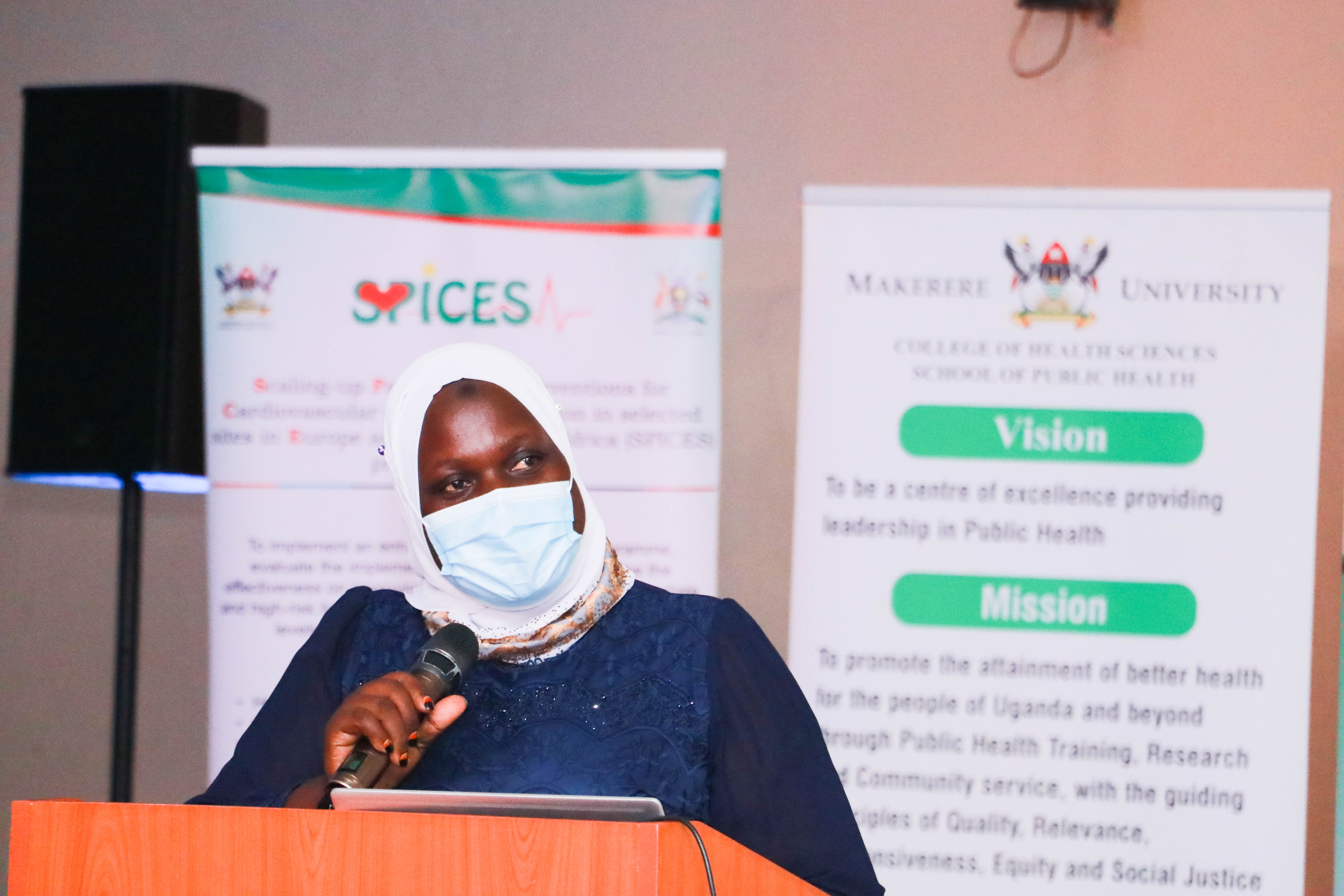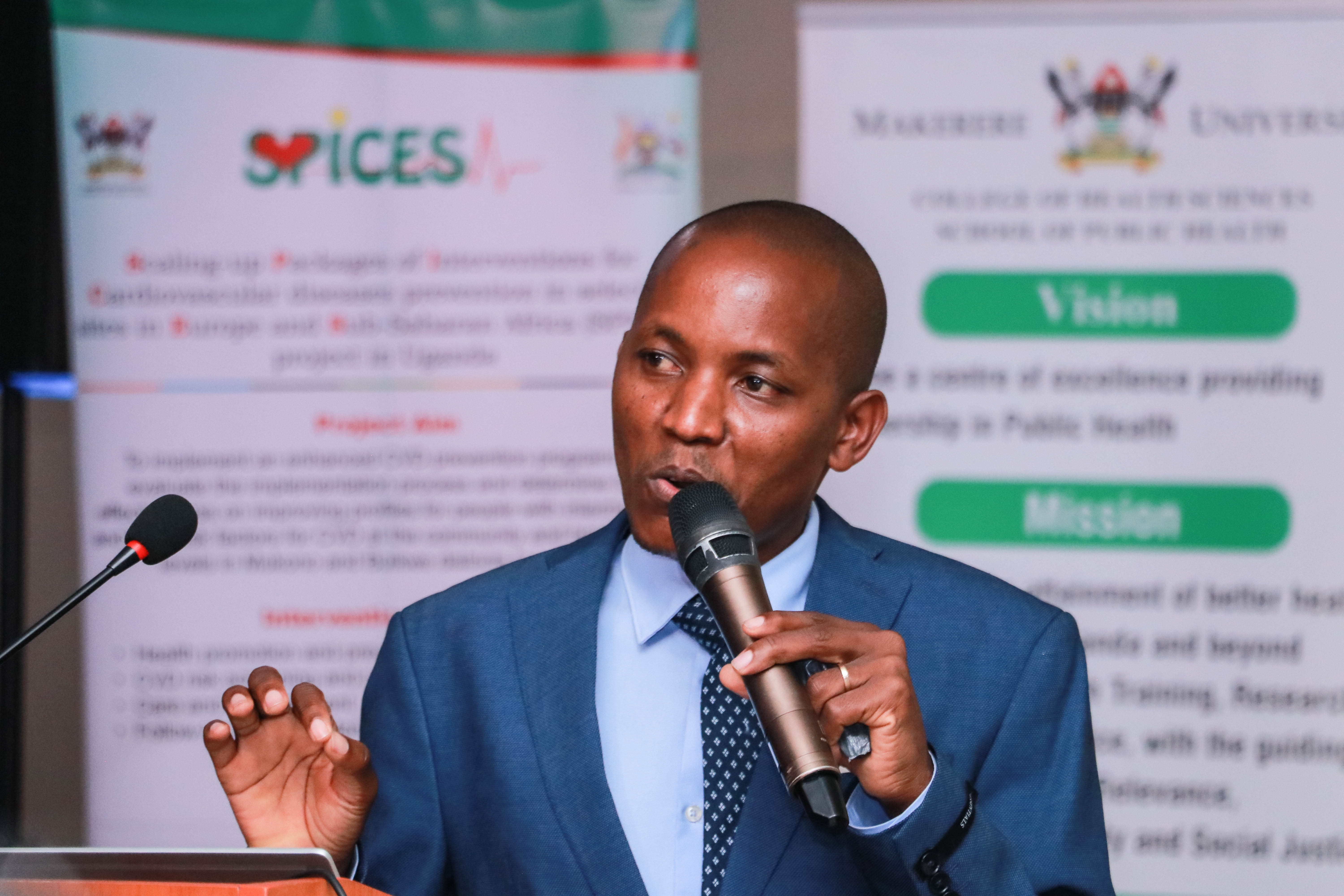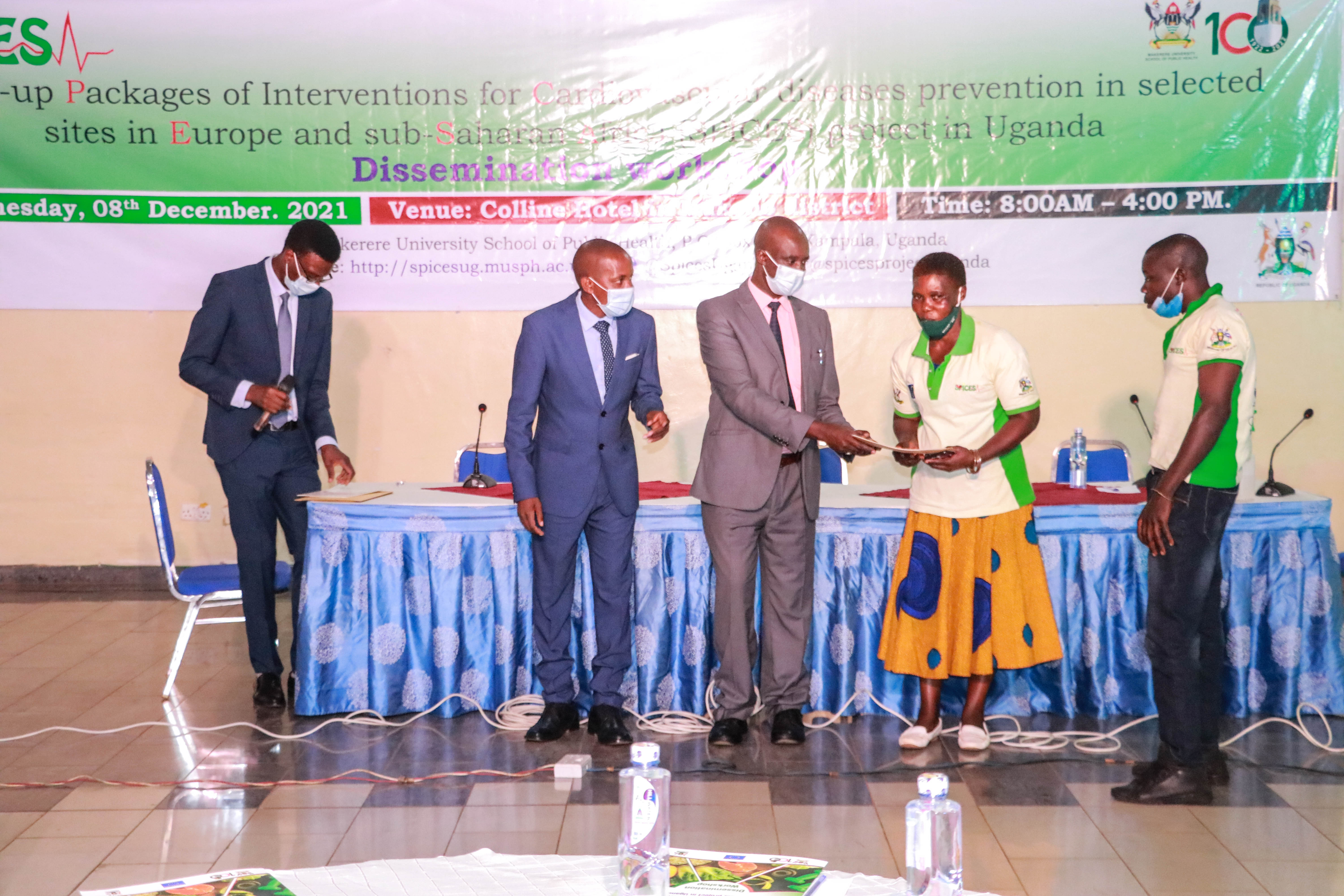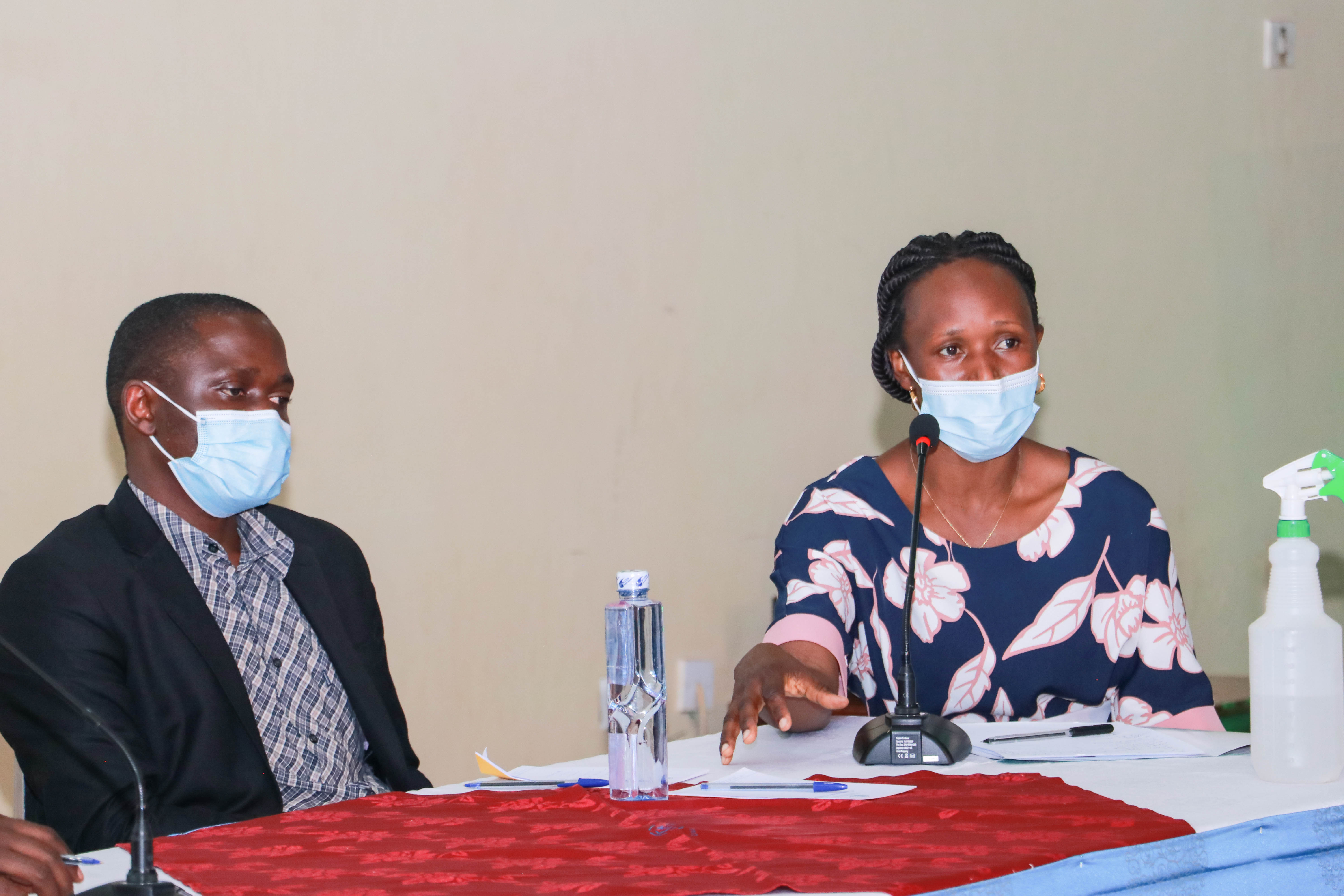
A VHT submits during the dissemination workshop held on December 8th 2021 at Colline Hotel in Mukono district.
Hajat Fatuma Ndisaba Nabitaka, the Resident District Commissioner for Mukono district has appealed to Ugandan legislators to support efforts of community health workers (CHWs)/VHTs through appropriating some remuneration for them.
Hajat Nabitaka said she has moved the entire Mukono District during the COVID-19 pandemic period and throughout the taskforces and has since appreciated the great role played by CHWs.
“We thank you so much, you are the frontline soldiers. Because you do sensitize our people in the communities and you are always there throughout. If those in parliament could know what you do, they would speak passionately for you to receive some kind of salary,” said Hajat Nabitaka.
She was speaking at a dissemination workshop for Makerere University School of Public Health’s Cardiovascular Disease prevention program under the SPICES project held on December 8th 2021 at Colline Hotel in Mukono district.
“Sincerely speaking, we have many people who receive a lot of money, yet their out-put is minimal as compared to the work done by VHTs. I am appealing to the Commissioner [NCDs], researchers to advocate for renumeration for VHTs. I think this catchment area of the VHTs is the best. They are the ones who can solve some of the social problems affecting majority of families. Kindly think about the VHTs, keep up training the VHTs and speak for them,” she added.

Dr. Gerald Mutungi, assistant Commissioner Health Services- Non-Communicable Diseases (NCDs) department at the Ministry of Health says currently, the VHTs are working under non-monetary motivation scheme.
“They have been working and we are discussing their small allowance in the Ministry. The problem is that the numbers are so big. Even when you give them small allowances the budget becomes so big,” Dr. Mutungi observes.

He further advances that; “But to tell you the truth, the discussion is in the Ministry. I don’t know how it will end but this adds on the evidence that they are so useful and that they need to be motivated.”
The SPICES project Principal Investigator Dr. Geofrey Musinguzi says the study has proven that if well trained, community health workers (CHWs/VHTs) have potential to deliver messages on prevention and control of cardiovascular diseases as well as enhance awareness amongst the various risk factors that raise cardiovascular diseases.
Through VHTs, the SPICES project reached a total of 10,936 people in households in 80 randomly selected villages in Mukono and Buikwe. Dr. Musinguzi contends that, trained VHTs that are trusted in communities are a gateway to increased community knowledge about CVDs and participation.

“As you observed, out of the many people the y [VHTs] visited, only 1% rejected them in their households. So, 99% were receiving them. So, to us we really think that is one resource that is available. If supported, they can actually deliver more in prevention of cardiovascular diseases,” said Dr. Musinguzi.
Under community intervention model of the SPICES project, Dr. Musinguzi notes that the key enablers of implementing the program is the availability of committed and motivated VHTs, receptive communities, supporting local and religious leaders as well as social gatherings and infrastructure like SACCOs, worship places, local infrastructure such as radios, public address system for health education.
Despite the unprecedented times brought by COVID-19 community health workers with support from SPICES project reached out a number of households in the project area in respect to CVDs. The project sensitized and empowered community health workers and health workers on COVID-19 prevention and subsequently equipped with tools such as facemasks, sanitizers, temperature monitors and standard operating procedures.
“Community Health Workers are largely motivated and over two years working with them, we have actually seen them do a lot of work, deliver these interventions. They have also reached quite a number of people in the households. COVID was a problem in reaching out those places but amidst that challenge, we moved to the community members,” contends Dr. Musinguzi.
Sarah Nalweyiso, a Village Health Team Member in Buikwe District says they (community health workers) received training in September 2020 under the SPICES project on how to continue with the work amidst the pandemic challenges.
“We received gumboots, notebooks, pens, sanitizers and masks,” says Nalweyiso.

She adds that they trained community members about behavior change and highlighting dangers of excessive consumption of alcohol, benefits of exercising, reducing consumption of cooking oils as well as eating fruits and vegetables.
“When we finished the training, we came back to our villages and started examining people using the risk factor assessment tools to evaluate the risk of cardiovascular disease.”
Esther Namaganda, another VHT member from Buikwe district says; “We moved around our communities mainly to screen the members for risk factors of cardiovascular diseases.”
The poor health seeking behavior was one of the highlighted contributors to delayed presentation to health facilities with cardiovascular diseases.
Dr. Isaac Ssinabulya, Cardiologist at the Uganda Heart Institute -UHI thanked SPICES Project on the great work it has done.
“We conducted research, myself and Dr. Mutungi on non-communicable diseases and established that the highest percentage of the most affected people are in communities, nearly 60%. We only see fewer people in hospitals,” Dr. Ssinabulya.
He adds that there are many people who flock UHI from farther places in this country coming for treatment and end up spending a lot of money, yet the diseases can be prevented.
Dr. Ssinabulya hailed the Community Health Workers for their support in ensuring people are empowered and are able to be screened early enough in order to mitigate the risks associated to advanced treatment of CVDs which include high cost of treatment as well as loss of life.
Pressure is one of the highly prevalent diseases in Mukono and Buikwe at 24%. “This high number requires to ensure that whoever visits our health facilities is screened and are counseled towards keeping healthy lifestyles. Let us work together to reduce the queues of people coming for treatment,” says Dr. Ssinabulya.
Dr Josephine Birungi, a Senior Research Scientist based at Medical Research Council/Uganda Virus Research Institute (MRC/UVRI) in Entebbe underscored the role of VHTs and noted that their work and contribution can be sustained through continuous engagement and training.

She commended the VHTs on the good work. “We need to deploy family-centered-approach to educate the masses about these challenges such as NCDs. It will help efforts by SPICES project to continue. For instance if I knew my husband has diabetes, I will not put a lot of salt in food. But if I don’t know, we shall not make a change.”
She tipped both health workers and the Ministry of Health on continuous capacity building as well as sensitization of the masses.
“We need to sensitize the masses. We should reciprocate the attention we give to HIV/AIDs to NCDs. I appeal to all of you to support sensitization of our communities not only about heart diseases but also on other diseases such as HIV/AIDs among others,” Dr. Birungi.
By Davidson Ndyabahika

